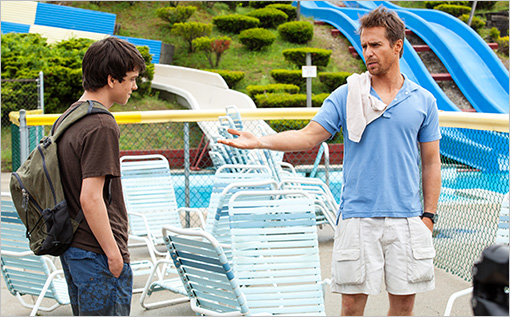Directed by Nat Faxon and Jim Rash
Written by Nat Faxon and Jim Rash
USA, 2013
Note. This review was originally published in April 2013, in conjunction with The Way, Way Back playing at the Phoenix Film Festival.
The Way, Way Back belongs, in no small way, to the same subgenre of low-key indie dramedies like Little Miss Sunshine and Juno, small-town stories populated with well-known actors and an almost sitcom-esque quality to the dialogue. Where this film, written and directed by Nat Faxon and Jim Rash, breaks free from such familiar shackles is in its impressive ensemble cast, specifically the teen actor Liam James and the raffish character actor Sam Rockwell. The Way, Way Back is maybe a touch formulaic, but it’s an assured, enjoyable, and bittersweet coming-of-age story.
James plays Duncan, an introverted, miserable 14-year old traveling with his mom (Toni Collette), her new boyfriend Trent (Steve Carell), and his daughter (Zoe Levin) to his beach house for the summer, even though Duncan would rather be staying with his father. Once he arrives, Duncan only finds solace by spending time at Water Wizz, the local water park, run by the cheerfully outrageous Owen (Rockwell), and beginning to connect with the beautiful girl next door, Susanna (AnnaSophia Robb). As Duncan gains his confidence, he’s unable to look the other way as he correctly surmises that Owen and his mother’s relationship is on shaky ground.
There are few things more joyous in the modern American cinema than watching Sam Rockwell get free rein to do whatever he damn well pleases, and that’s often what it feels like watching him in The Way, Way Back. Owen is as much of a scoundrel as one can be while managing a low-rent water park, constantly trying to hook up with a co-worker (Maya Rudolph) or goofing off with his fellow employees. We don’t learn too much about Owen, if he has some dark past, and honestly, we don’t need to know if he has one. Rockwell is an actor with immense reserves of multidimensionality, so we can read into his glances and line deliveries any number of backstories. Faxon and Rash don’t dig too deep into their characters’ pasts, teasing them a bit as if these people sprung out of a short story, letting us fill in the blanks.
Rockwell’s well matched by James, a young actor whose task–playing an aggressively awkward, lonely boy–doesn’t seem nearly that challenging because he legitimately looks the part. Too often, actors playing these recognizable teenage roles are a bit too old, a little too tall, bursting out of their skin so they can convince us that they’re really leading men in disguise. James hunches over just slightly as he walks, he talks in a halting fashion, and he rarely makes eye contact in the first half, allowing his gradual transformation into a somewhat self-possessed nerd more believable and gratifying to watch. The tentative friendship Duncan strikes up with Susanna is equally delightful, as Robb takes on a chattier role with aplomb. Her connection with Duncan is compounded by her refusal to be one of the other girls, all perhaps a bit too stereotypically obnoxious.
The core group of characters are well developed, as are those supporting characters at Water Wizz. The most complex statement Faxon and Rash make through the script is that traveling to a beach house for the summer essentially infantilizes the adults, to a point where some of the teenagers seem more responsible. Carell, Collette, Allison Janney, Rob Corddry, and Amanda Peet, in smaller roles of varying degrees, indulge in their inner hypocrite, especially in the first 30 minutes of the film. If anything, the only issue is that the adults are so self-absorbed and juvenile that when they’re eventually forced to acknowledge the long-term consequences of some of their actions, making you wonder what it’d be like to get just a little bit more from their perspective. Collette’s character, specifically, is one who could’ve received a bit more fleshing-out to further understand her troubled psyche.
Yet The Way, Way Back is a sterling directorial debut from Faxon and Rash, fresh off their Oscar win for The Descendants‘ adapted screenplay. (Both also have small roles as Water Wizz employees.) We have seen coming-of-age movies before, we know the cliches and tropes, and we know where these stories end up. The Way, Way Back sidesteps most of these predictable trappings, avoiding the easy way out all the way to the final shot. By the final shot, we want so badly for Duncan to receive some small amount of grace, to see a light at the end of his dark tunnel. His victories are small, but the movie in which he gets them is all the more powerful and earned because it wisely doesn’t overreach.
— Josh Spiegel





